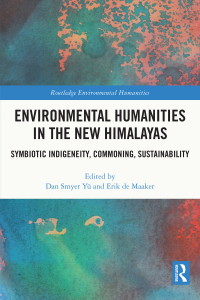Buy Environmental Humanities in the New Himalayas: Symbiotic Indigeneity, Commoning, Sustainability 1st Edition PDF ebook by author 9780367699796, 0367699796 – published by Routledge in 2021 and save up to 80% compared to the print version of this textbook. With PDF version of this textbook, not only save you money, you can also highlight, add text, underline add post-it notes, bookmarks to pages, instantly search for the major terms or chapter titles, etc.
You can search our site for other versions of the Environmental Humanities in the New Himalayas: Symbiotic Indigeneity, Commoning, Sustainability 1st Edition PDF ebook. You can also search for others PDF ebooks from publisher Routledge, as well as from your favorite authors. We have thousands of online textbooks and course materials (mostly in PDF) that you can download immediately after purchase.
Note: e-textBooks do not come with access codes, CDs/DVDs, workbooks, and other supplemental items.
eBook Details:
Full title: Environmental Humanities in the New Himalayas: Symbiotic Indigeneity, Commoning, Sustainability 1st Edition
Edition: 1st
Copyright year: 2021
Publisher: Routledge
Author: 9780367699796, 0367699796
ISBN: 9780367699796
Format: PDF
Description of Environmental Humanities in the New Himalayas: Symbiotic Indigeneity, Commoning, Sustainability 1st Edition:
Environmental Humanities in the New Himalayas: Symbiotic Indigeneity, Commoning, Sustainability howcases how the eco-geological creativity of the earth is integrally woven into the landforms, cultures, and cosmovisions of modern Himalayan communities. Unique in scope, this book features case studies from Bhutan, Assam, Sikkim, Tibet, Nepal, Pakistan, and Sino-Indian borderlands, many of which are documented by authors from indigenous Himalayan communities. It explores three environmental characteristics of modern Himalayas: the anthropogenic, the indigenous, and the animist. Focusing on the sentient relations of human-, animal-, and spirit-worlds with the earth in different parts of the Himalayas, the authors present the complex meanings of indigeneity, commons, and sustainability in the Anthropocene. In doing so, they show the vital role that indigenous stories and perspectives play in building new regional and planetary environmental ethics for a sustainable future. Drawing on a wide range of expert contributions from the natural sciences, social sciences, and humanist disciplines, this book will be of great interest to students and scholars of environmental humanities, religion and ecology, indigenous knowledge and sustainable development more broadly.





